What a difference a year — and an election — makes. After months of gridlock, the newly elected British Parliament easily approved the Brexit deal last week. Days later, political leaders in Northern Ireland agreed to resume power-sharing after a three-year hiatus. At the end of January, the U.K. will almost certainly leave the European Union and begin negotiations on the future relationship.
Is Brexit finally happening?
Yes. Boris Johnson was re-elected prime minister on December 12 with an 80-seat majority. Before the new members of parliament (MPs) left for the holidays, they gave initial approval to the Withdrawal Agreement Bill. On January 11, the House of Commons voted 330 to 231 on the bill’s third and final reading. This legislation will implement the Brexit deal in British law; it covers divorce payments to the EU, citizens’ rights, customs arrangements for Northern Ireland, and the transition period.
The 99-vote majority (including all Conservative MPs) for the bill was a stark contrast to the repeated failure of Johnson’s predecessor, Theresa May, to get her deal ratified. He benefitted from a sizeable parliamentary majority, as well as his success last fall in replacing the unpopular Northern Ireland backstop with other arrangements.
The House of Lords will debate the bill this week. The Lords could make amendments, particularly on areas where the government changed an earlier version of the bill. Key concerns include the reunification of child refugees with their families and parliamentary scrutiny of the government’s negotiations with the EU. If the bill is amended, it will return to the Commons. The European Parliament is expected to ratify the deal on January 29.
Will anything change on February 1?
The U.K. is set to leave the EU at 11pm GMT (midnight in Brussels) on January 31. This will launch an 11-month transition period, enabling time for businesses and citizens to adjust to the new realities and for the U.K. and EU to determine their future relationship. The U.K. will leave the EU’s political institutions, including the European Parliament and Council of Ministers. It will have no say in making EU rules, but it will be bound by them during this period. The U.K. will remain in the EU’s customs union and the single market, while citizens can continue to work and travel freely between the U.K. and EU.
What issues still need to be resolved?
During the transition period, the sides will negotiate their future relationship. The Withdrawal Agreement Bill gives Johnson 30 days to publish his negotiating objectives, while EU member states are expected to agree on their mandate on February 25. Formal talks, which will remain led on the European side by Michel Barnier, will likely begin in March.
The main task will be reaching agreement on a trade deal, addressing goods and services as well as regulations on health, fishing, farming, banking, science, education, aviation, transportation, and data exchange. The sides must also agree how to cooperate on security and law enforcement, including the handling of approximately 40 EU measures on policing and judicial cooperation (e.g., the U.K. will leave Europol and the European Arrest Warrant). The British government wants a loose deal focused on tariff and quota free trade, frequently citing the recently concluded EU-Canada free trade agreement. The EU has set “zero dumping” conditions as the pre-requisite for “zero tariffs and zero quotas”; it will also insist on a level playing field, including social and environmental standards, state aid, and tax.
On January 8, European Commission President Ursula von der Leyen and Johnson held a friendly meeting in London. Yet she warned that 11 months was too tight to reach a comprehensive agreement. (The EU-Canada agreement, for comparison, took seven years. If the sides reach a “mixed agreement” — containing matters handled by the EU as well as issues governed by “shared competence” between the EU and member states — then the new agreement must be ratified by all 27 member states according to their constitutional provisions, which in some cases includes regional parliaments.) The British government could ask the EU to extend the transition period for one or two years, but it must do so before July 1. Johnson included a provision in the Withdrawal Agreement Bill that outlaws a request, though it could be amended later. The EU has made clear that there will be no extension granted after that date. If the sides fail to reach agreement by December 31, the consequences would be similar to the “no-deal Brexit” feared last year, as the U.K. would default to trading with the EU on World Trade Organization (WTO) terms. The more likely scenario is a limited trade deal that would necessitate further discussion on many issues in the coming years.
On the domestic side, the British government must pass legislation in four key areas to implement Brexit in areas that are currently regulated by the EU: new immigration laws to replace freedom of movement and new legislation for agriculture, environment, and trade. In the Queen’s Speech that opened the new Parliament, the government also pledged bills on fisheries, financial services, and private international law.
In addition, London will begin negotiating free trade agreements with the U.S. and others. However, the government will likely want clarity on economic relations with the EU before finalizing such deals, as it cannot be aligned in regulatory terms with multiple systems. The U.K. will confront tough demands from Washington on issues such as pharmaceutical pricing, food standards, and environmental issues.
Does Northern Ireland finally have a government?
On January 10, Northern Ireland’s main political parties agreed to a deal — promoted by the British and Irish governments as a “New Decade, New Approach” — that led to the restoration of a power-sharing government after a three-year break. The Stormont Assembly met on January 11 to elect new leadership. There are two women at the helm: First Minister Arlene Foster (leader of the Democratic Unionist Party) and Deputy First Minister Michelle O’Neill (deputy leader of Sinn Féin). Alex Maskey of Sinn Féin was elected Speaker. On January 13, Johnson and his Irish counterpart, Leo Varadkar, visited Belfast to meet the new leadership and express their support.
The government collapsed in January 2017 over the handling of a domestic green energy project, while the politics of Brexit complicated efforts to restore trust. Leaders of the Democratic Unionist Party and Sinn Féin were threatened with new assembly elections if they did not agree a deal by January 13, which was an unappealing prospect after both parties suffered losses in the U.K.’s December election. A key element of the deal was the creation of two new “language commissioners” as part of a plan to put the Irish language (Gaelic) on par with English while preserving Ulster British culture. The British government also promised additional funding for local services, including health, education, infrastructure, and police.
What is Megxit?
As British voters and journalists tire of Brexit, attention turned last week to the surprise announcement by the duke and duchess of Sussex, Prince Harry and Meghan Markle, of their intention “to step back as ‘senior’ members of the Royal Family and work to become financially independent.” They plan “to balance [their] time between the United Kingdom and North America, continuing to honour [their] duty to The Queen, the Commonwealth, and [their] patronages.” On January 13, senior royals met for the “Sandringham summit” (at the Queen’s private country house) and agreed that the couple will begin a “period of transition” as discussions continue. Supporters of the move cited racist attacks on Markle by Britain’s tabloid press; critics rejected such claims, suggesting the couple wants British taxpayer money without performing the work of the royal family.
The Brookings Institution is committed to quality, independence, and impact.
We are supported by a diverse array of funders. In line with our values and policies, each Brookings publication represents the sole views of its author(s).

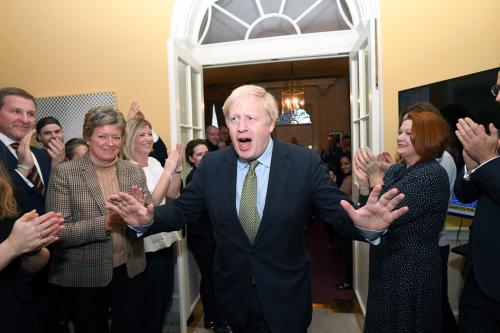
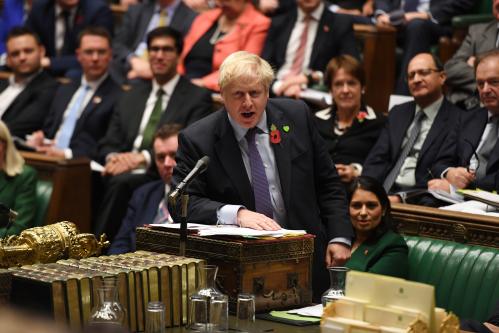
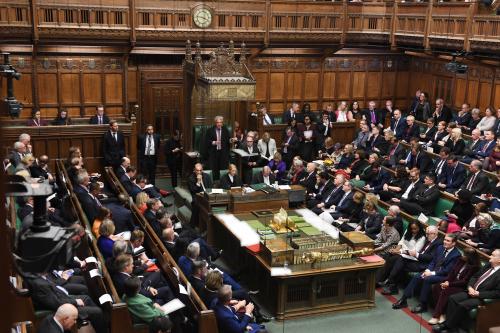


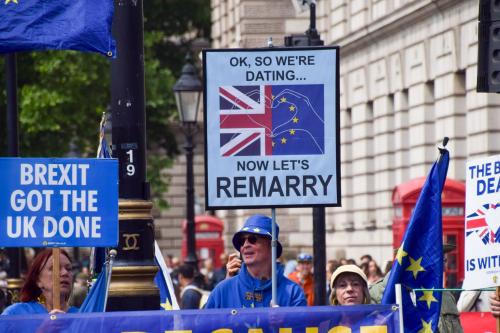
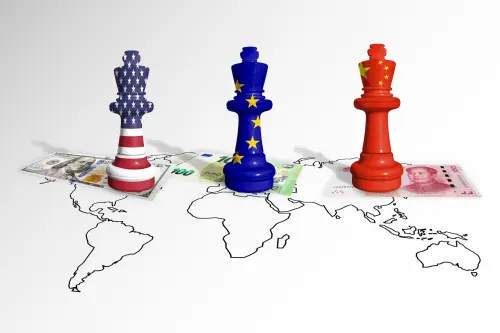
Commentary
Brexit endgame: Brexit nears, Northern Ireland assembly reconvenes, and Megxit distracts
January 13, 2020